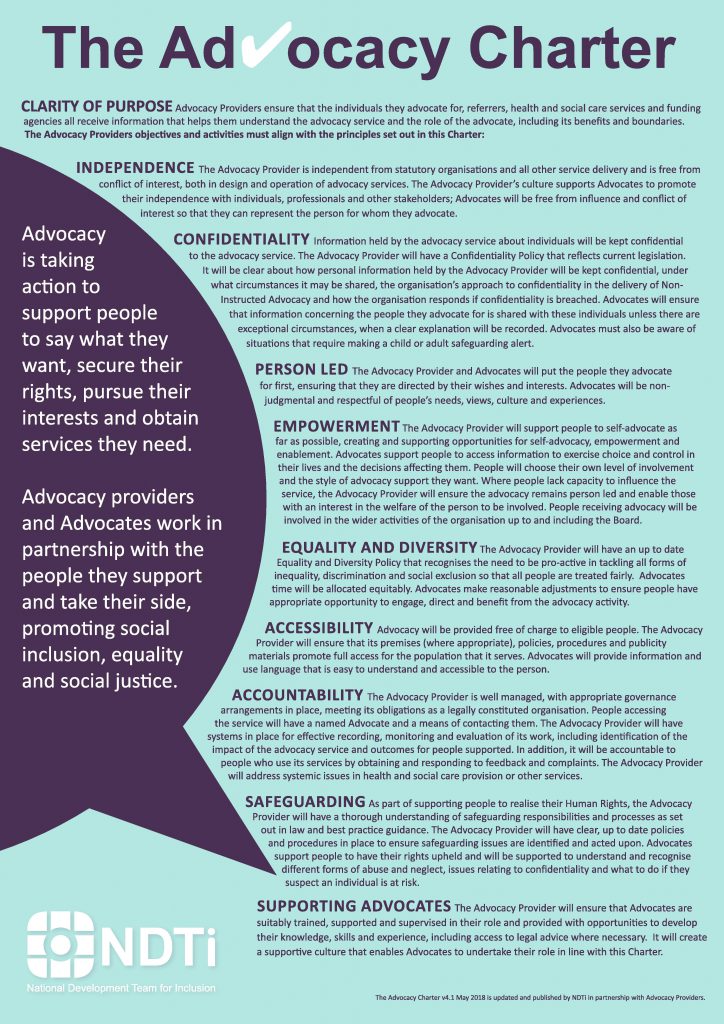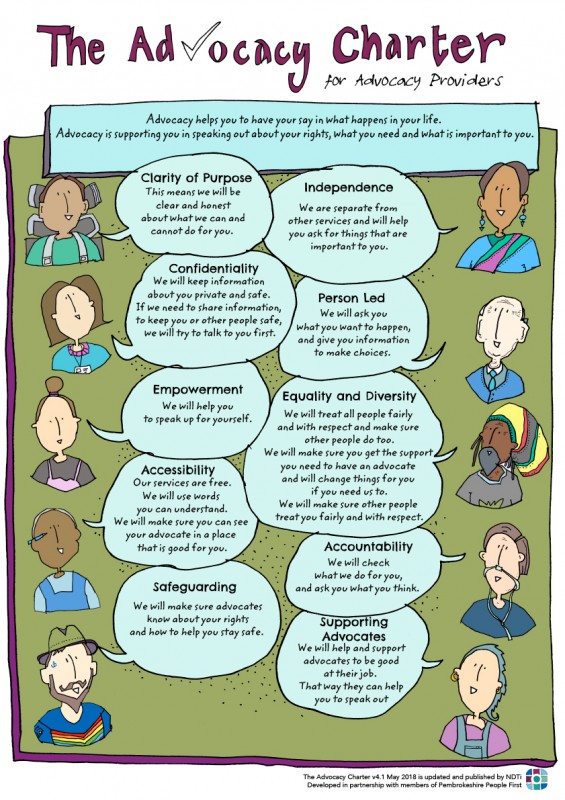Advocacy is working with you to:
- Listen to what you want and act on your behalf at all times
- Think about what choices you have
- Put forward your views so they are heard
- Stand up for your rights and interests
Advocacy is free, independent and confidential.
If advocacy is not the right service for you, we will help you to identify other services that can support you.
Please watch this video to find out what advocacy can do for you.
The Advocacy Charter
As an advocacy organisation, we follow the Advocacy Charter (2018). This lists all the different principles of advocacy that we work hard to meet.
Here is what the Charter says about what advocacy means:
“Advocacy is taking action to support people to say what they want, secure their rights, pursue their interests and obtain services they need.
“Advocacy providers and Advocates work in partnership with the people they support and take their side, promoting social inclusion, equality and social justice.”
(The Advocacy Charter, 2018)
Types of Advocacy
One-to-one advocacy
One to one advocacy may be provided by an independently paid professional or by volunteers with relevant training and/or experience. This type of advocacy is common to all client groups and occurs when one person speaks up on another’s behalf. An advocate stands beside the advocacy partner and focuses on seeing things from that person’s perspective.
The advocate is not there to represent their own views but to represent the advocacy partner’s interests as if they were their own. An advocate does not make judgments about what is in a person’s “best interest”. An advocate will always encourage a person to speak for themselves where ever this is possible.
One-to-one advocacy can be:
- Short-term, ‘issue-based’ advocacy. In general it means that advocacy is offered to address a particular issue or situation. It is not intended to be ongoing but will exist for the time it takes to resolve the issue.
- Community Advocacy – this is about providing advocacy support as soon as possible to deal with an urgent situation. For example, someone experiencing mental distress has a problem with housing which left unresolved may result in them becoming homeless.
Statutory Advocacy
Certain people have a legal right to advocacy under the Mental Health Act, Mental Capacity Act and the Care Act. This is intended to provide extra safeguards for some of the most vulnerable people in society.
For further information, please follow these links:
Community Advocacy
Community or non-statutory advocacy refers to all advocacy that is not a legal entitlement. It can support you with a range of situations you may come across in your daily life. Advocates may be independent paid professionals or volunteers with relevant training and experience.
At The Advonet Group, we have different Community Advocacy options to meet the needs of as many people as possible. These include:
- Self-advocacy: Working with an advocate to help you use our self-advocacy resources and speak up on your own behalf, or as part of a group. You can also download these resources from our website to use.
- Drop-in Advocacy Hub sessions located at different venues and community locations in Leeds.
- Short-term, issue-based Community Advocacy is where you and your advocate will agree how they can support you to address and progress the advocacy issue you have by completing an agreed task, such as supporting you to attend a meeting to have your views heard.
Citizen Advocacy
Citizen Advocacy is a partnership between two people, a volunteer and the person who needs advocacy support. It is often a longer-term commitment where an advocacy relationship can grow. A citizen Advocate is a person who volunteers to speak up for and support an advocacy partner and is not paid to do so.
Our Asking You! team have a Citizen Advocacy service. Find out more here: Citizen Advocacy
Peer Advocacy/Group Advocacy
Peer Advocacy refers to ‘experts by experience’, and is used to describe advocacy relationships where both the advocate and the advocacy partner share similar experiences, difficulties or discrimination. This could include people with a learning disability, mental ill health, the elderly or people from minority ethnic groups.
Peer advocacy often happens naturally where groups of people are together, for example in residential homes, hospital wards, self advocacy groups, or self help groups. Often it happens because one person feels more able to speak up than others and people feel united because of a common cause. The relationship between the group members is one of mutual support and empowerment. The primary qualification is their own experience of disability, exclusion or using services.
Some people may prefer to have an advocate who has had similar experiences; they are then supported by someone who “understands” by experience and will not be judgmental about their circumstances.
People First Groups
Some Self-Advocacy groups are referred to as People First groups. They are groups of people with learning difficulties, people with intellectual disabilities, people with developmental disabilities and/or people with disabilities who speak up for themselves and work to improve the lives of their members.
The People First movement started in America in 1974 and soon spread across the world. Locally they are independent groups promoting self-advocacy and are run by their members. They link into a national network of People First groups to form a collective voice in order to lobby those in authority to bring about change.
Leep1 – Leeds People First are a People First Group based in Leeds. They are part of The Advonet Group.









